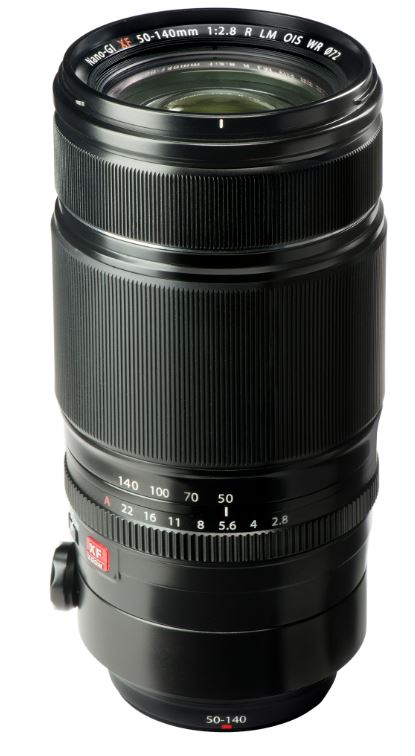
Fujifilm XF50-140mm LM OIS WR Lens
About Fujifilm
Fujifilm, also known as Fujifilm Holdings Corporation, is a Japanese multinational corporation that specializes in imaging and photographic products, as well as various other technologies and services. Fujifilm has a long and storied history dating back to its founding in 1934 as Fuji Photo Film Co., Ltd. The company’s headquarters are located in Tokyo, Japan.
Here are some key aspects and areas of focus for Fujifilm:
- Photography and Imaging: Fujifilm is renowned for its photographic film and cameras, including popular brands like Fujifilm Instax instant cameras and the Fujifilm X-series mirrorless digital cameras. They produce a wide range of photographic products, including film, digital cameras, lenses, and accessories.
- Medical Imaging: Fujifilm has a significant presence in the healthcare industry, providing medical imaging equipment and solutions, including digital X-ray systems, medical printers, endoscopy systems, and more. Their healthcare division plays a crucial role in diagnostic imaging and medical informatics.
- Graphic Arts: Fujifilm is a major player in the graphic arts and printing industry, offering a range of solutions for commercial printing, packaging, and label printing. This includes digital printing equipment, inkjet technologies, and workflow software.
- Document Solutions: Fujifilm provides document solutions, including photocopiers, multifunction devices, and document management software, aimed at improving office productivity and efficiency.
- Materials and Chemicals: The company produces a variety of high-performance materials and chemicals used in industries such as semiconductors, display panels, and flat-panel displays.
- Digital Cameras and Lenses: Fujifilm’s X-series of mirrorless cameras and Fujinon lenses have gained popularity among both amateur and professional photographers for their image quality and innovative features.
- Instant Photography: Fujifilm’s Instax series of instant cameras and film have revived interest in instant photography and are popular among young users for their retro appeal.
- Photographic Film: While digital photography has largely replaced film in many areas, Fujifilm still produces a range of film products for photographers who prefer analog photography.
- Research and Development: Fujifilm invests heavily in research and development, which has led to innovations in various fields, from photography to healthcare and materials science.
Fujifilm has adapted to the changing technological landscape by diversifying its business interests beyond traditional photography. The company’s commitment to research and innovation has allowed it to remain relevant in the digital age while maintaining a strong presence in photography and imaging.
For Your Safety
Be sure to read these notes before use
Safety Notes Thank you for your purchase of this prod- uct. For repair, inspection, and internal testing, contact your FUJIFILM dealer.
- Make sure that you use the lens correctly. Read these safety notes and the camera Owner’s Manual carefully before use.
- After reading these safety notes, store them in a safe place.
About the Icons
The icons shown below are used in this document to indicate the severity of the injury or damage that can result if the information indicated by the icon is ignored and the product is used incorrectly as a result.
WARNING
- Do not immerse in or expose to water. Failure to observe this precaution I sauce in the bathroom can cause a fire or electric shock.
- Do not disassemble (do not open the case). Failure to observe this precaution can cause fire, electric disassemble shock, or injury due to product malfunction
- Should the case break open as the result of a fall or other accident, do not touch the exposed parts. Failure to observe this precaution could result in electric shock or injury from touching the damaged parts. Do not touch Remove the camera battery parts mediately, taking care to avoid jury or electric shock, and take the product to the point of purchase for consultation.
CAUTION
- Keep the sun out of the frame when shooting backlit subjects. Sunlight focused on the camera when the sun is in or close to the frame can cause fire or burns.
- When the product is not in use, replace the lens caps and store them out of direct sunlight. Sunlight focused by the lens can cause fire or burns.
- Do not carry the camera or lens while they are attached to a tripod. The product can fall or strike other ob. jects, causing injury.
- Do not rapidly rotate the camera while holding the grip. Your hand could strike the tripod or tripod collar foot, causing injury.
- Before handling the camera, fully tighten or loosen the tripod collar lock screw according to whether the camera will be used in a fixed orientation or rotated. If the screw is only partially tightened, the camera may move unexpectedly, causing injury.
For Customers in the U.S.A.
Tested To Comply With FCC Standards FOR HOME OR OFFICE USE
FCC Statement: This device complies with Part 15 of the FCC Rules. Operation is subject to the following two conditions:
- This device may not cause harmful interference, and
- this device must accept any interference received, including interference that may cause undesired operation.
CAUTION: This equipment has been tested and found to comply with the limits for a Class B digital device, under Part 15 of the FCC Rules. These limits are designed to provide reasonable protection against harmful interference in a residential installation. This equipment generates, uses, and can radiate radio frequency energy and, if not installed and used by the instructions, may cause harmful interference to radio communications. However, there is no guarantee that interference will not occur in a particular installation. If this equipment does cause harmful interference to radio or television reception, which can be termined by turning the equipment off and on, the user is encouraged to try to correct the interference by one or more of the following measures:
- Reorient or relocate the receiving antenna.
- Increase the separation between the equipment and the receiver
- Connect the equipment to an outlet on a circuit different from that to which the receiver is connected. • Consult the dealer or an experienced radio/TV technician for help.
- You are cautioned that any changes or modifications not expressly approved in this manual could void the user’s authority to operate the equipment.
Notes on the Grant: To comply with Part 15 of the FCC Rules, this product must be used with a Fuiifilm-specified ferrite-core A/ cable, USB cable, and DC supply cord.
For Customers in Canada
CAN ICES-3 (BINMB-3(B)
CAUTION: This Class B digital apparatus complies with Canadian ICES_003
IMPORTANT SAFETY INSTRUCTIONS
- Read these instructions.
- Keep these instructions.
- Heed all warnings.
- Follow all instructions.
- Do not use this apparatus near water (excluding waterproof products).
- Clean only with a dry cloth.
- Do not block any ventilation openings. Install by the manufacturer’s instructions.
- Do not install near any heat sources such as radiators, heat registers, stoves, or other apparatus (including amplifiers) that produce heat.
- Protect the power cord from being walked on or pinched particularly at plugs, convenience receptacles, and the point where they exit from the apparatus.
- Only use attachments/accessories specified by the manufacturer.
- Unplug this apparatus during lightning storms or when unused for long periods. Refer all servicing to qualified service personnel. Servicing is required when the apparatus has been damaged in any way, such as a power supply cord or plug is damaged, liquid has been spilled or objects have fallen into the apparatus, the apparatus has been exposed to rain or moisture, does not operate normally, or has been dropped.
Disposal of Electrical and Electronic Equipment in Private Households
In the European Union, Norway, Iceland, and Liechtenstein: This symbol on the product, in the manual and the warranty, and/or on its packaging dictates that this product shall not be treated as household waste. Instead, it should be taken to an applicable collection point for the recycling of electrical and electronic equipment. By ensuring this product is disposed of correctly, you will help prevent potential negative consequences to the environment and human health, which could otherwise be caused by inappropriate waste handling of the product. The recycling of materials will help to conserve natural resources. For more detailed information about recycling this product, please contact your local city office, your household waste disposal service, or the shop where you purchased the product.
- In Countries Outside the European Union, Norway, Iceland, and Liechtenstein: If you wish to discard this product, including the batteries or accumulators, please contact your local authorities and ask for the correct way of disposal.
Before Using This Product
Some lens features are not available with older versions of the camera firmware. Be sure to update the camera firmware to the latest version. Instructions on viewing the camera firmware version and updating the camera firmware are available from the following website:
If you do not have access to a computer, support is available from the local distributor listed in the “FUJIFILM Worldwide Network” material provided with your camera.
Product Care
- When using a lens hood, do not pick up or hold the camera using only the hood.
- Keep the lens signal contacts clean.
- Use a blower to remove dust and lint from the glass surfaces of the lens or filter. To remove smudges and fingerprints, apply a small amount of lens cleaner to a soft, clean cotton cloth or lens-cleaning tissue and clean from the center outwards using a circular motion, taking care not to leave smears or touch the glass with your fingers.
- Never use organic solvents such as paint thinner or benzene to clean the lens.
- Attach the front and rear caps when the lens is not in use.
- Store the lens and filter in cool, dry locations to prevent mold and rust. Do not store in direct sunlight or with naphtha or camphor moth balls.
- Keep the lens dry. Rusting can cause irreparable damage. Wipe off rain and water droplets.
- Leaving the lens in extremely hot locations could cause damage or warping.
- Note that depending on the positions of the camera and tripod, the hand holding the camera grip may contact the tripod or tripod collar foot when the camera is rotated.
Parts of the Lens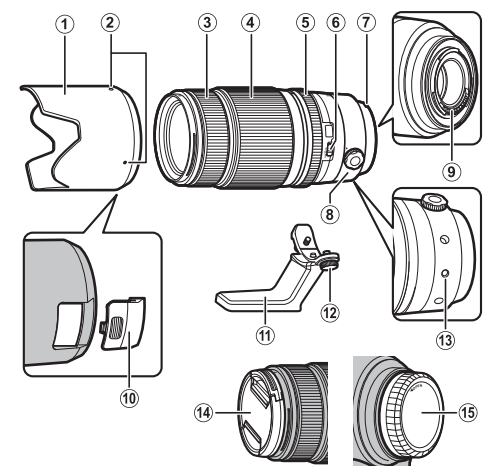
- Lens hood
- Mounting marks
- Focus ring
- Zoom ring
- Aperture ring
- 0.15. switch
- Mounting marks (focal length)
- Tripod collar lock screw
- Lens signal contacts
- Removable cover for access to polarizing filter
- Tripod collar foot
- Tripod foot mounting screw
- Lens rotating position index
- Front lens cap 15 Rear lens cap
Note: The lens mount includes a rubber ring to ensure that the lens remains dust- and splash-proof. The ring can be replaced for a fee at any FUJIFILM service center.
Attaching the Lens
See the camera manual for information on attaching and removing lenses. Note that this product is not compatible with X-mount film cameras.
Removing the Caps
Remove the caps as shown.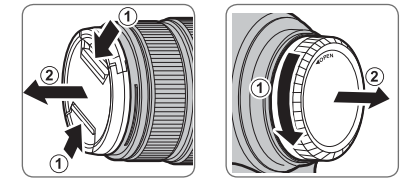
Attaching the Hood
When attached, lens hoods reduce glare and protect the front lens element.
Supplied Accessories
- Front lens cap
- Rear lens cap
- Lens hood
- Cloth wrapping
- Tripod collar foot
The Polarizing Filter
- To access the polarizing filter, detach the removable cover before attaching the lens hood.

- The filter can be rotated by inserting a finger through the hole.

The Tripod Collar
- Foot To attach the tripod collar foot, align the mounting mark on the foot with the lens rotate- ing position index and tighten the tripod foot mounting screw.

To rotate the camera from landscape to portrait orientation or back again without taking it off the tripod, loosen the tripod collar lock screw.
Note: Tighten the screw securely to prevent the camera from rotating un- expectedly.
Zoom
Rotate the zoom ring left to zoom out, during magnification and increase the area visible in the frame. Rotate the ring right to zoom in, increasing magnification so that the subject occupies more of the frame.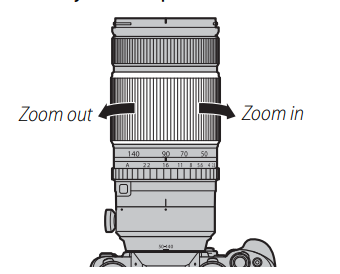
Warning Using the zoom ring while the lens is wet makes it easier for water to find its way inside the lens. Wipe any water from the lens before using the zoom ring.
Optical Image Stabilization (OIS)
To use optical image stabilization, slide the O..S. switch to ON.
The Aperture Ring
At settings other than A, you can adjust the aperture by rotating the lens aperture ring (ex-posture modes A and M). 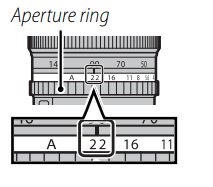
Specifications
Warning
Improvements may result in unannounced changes to specifications and appearance.
Warning
Owing to how this lens is constructed, the “Distance indicator” displayed by the camera may in some cases differ from the actual focus distance. Use the “Distance indicator” as a guide only.
FAQS About Fujifilm XF50-140mm LM OIS WR Lens
What is the Fuji 50/140’s minimum focus distance?
3.3 feet
The Fuji 50/140 is weatherproof.
weather-resistant
The XF50 140 debuted when?
2009 September 9
The internal zoom of the Fuji 50 140 is it.
Internal zoom is a characteristic of the XF 50-140mm lens.
The Fujifilm XF 50 140 has what size filter?
The Fujifilm XF 50-140mm F2. 8 R LM OIS WR has a 72mm filter thread size.
What is the weight of the Fujifilm xf50 140?
995g (2.19 lbs)
What is a lens’ maximum focusing distance?
All normal lenses can focus at a maximum distance of infinity.
What does a Fujifilm lens’ WR stand for?
Weather Resistant, or WR
How far away must the focal point be?
Each lens has a minimum focusing distance at which it may capture an image.
What is Fujifilm’s ISO?
The sensor’s sensitivity to light is measured by ISO.
For more manuals by Fujifilm, Visit Manualsdock
[embeddoc url=”https://manualsdock.com/wp-content/uploads/2023/09/Fujifilm-XF50-140mm-LM-OIS-WR-Lens-Owner-Manual.pdf” download=”all”]


